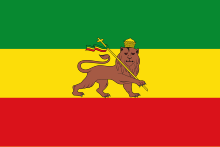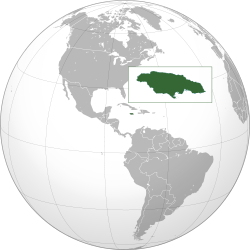Portal:Jamaica
The Jamaica Portal
Jamaica (/dʒəˈmeɪkə/ jə-MAY-kə; Jamaican Patois: Jumieka [dʒʌˈmie̯ka]) is an island country in the Caribbean Sea and the West Indies. At 10,990 square kilometres (4,240 sq mi), it is the third largest island—after Cuba and Hispaniola—of the Greater Antilles and the Caribbean. Jamaica lies about 145 km (90 mi) south of Cuba, 191 km (119 mi) west of Hispaniola (the island containing Haiti and the Dominican Republic), and 215 km (134 mi) south-east of the Cayman Islands (a British Overseas Territory). With 2.8 million people,0 Jamaica is the third most populous Anglophone country in the Americas (after the United States and Canada), and the fourth most populous country in the Caribbean. Kingston is the country's capital and largest city. Most Jamaicans are of Sub-Saharan African ancestry, with significant European, East Asian (primarily Chinese), Indian, Lebanese, and mixed-race minorities. Because of a high rate of emigration for work since the 1960s, there is a large Jamaican diaspora, particularly in Canada, the United Kingdom, and the United States. The country has a global influence that belies its small size; it was the birthplace of the Rastafari religion, reggae music (and such associated genres as dub, ska and dancehall), and it is internationally prominent in sports, including cricket, sprinting, and athletics. Jamaica has sometimes been considered the world's least populous cultural superpower. (Full article...) Selected article - Rastafari, sometimes called Rastafarianism, is an Abrahamic religion that developed in Jamaica during the 1930s. It is classified as both a new religious movement and a social movement by scholars of religion. There is no central authority in control of the movement and much diversity exists among practitioners, who are known as Rastafari, Rastafarians, or Rastas. Rastafari beliefs are based on a specific interpretation of the Bible. Central to the religion is a monotheistic belief in a single God, referred to as Jah, who is deemed to partially reside within each individual. Rastas accord key importance to Haile Selassie I, emperor of Ethiopia between 1930 and 1974; many regard him as the Second Coming of Jesus and Jah incarnate, while others see him as a human prophet who fully recognised Jah's presence in every individual. Rastafari is Afrocentric and focuses attention on the African diaspora, which it believes is oppressed within Western society, or "Babylon". Many Rastas call for this diaspora's resettlement in Africa, a continent they consider the Promised Land, or "Zion". Some practitioners extend these views into black supremacism. Rastas refer to their practices as "livity". Communal meetings are known as "groundations", and are typified by music, chanting, discussions, and the smoking of cannabis, the last regarded as a sacrament with beneficial properties. Rastas emphasise what they regard as living "naturally", adhering to ital dietary requirements, wearing their hair in dreadlocks, and following patriarchal gender roles. (Full article...)Did you know (auto-generated)
Selected biography -
Ena Collymore-Woodstock, OD, MBE (born 10 September 1917) is a Jamaican barrister and magistrate who throughout her career broke many barriers for women. After being orphaned, she joined the Auxiliary Territorial Service and trained as a radar operator, serving in Belgium and Britain. When the war ended, she earned a law degree and returned to Jamaica to become the first woman Court Clerk, Crown Solicitor, and Resident Magistrate. When the Juvenile Courts were established in the country, she served as its chair from 1964 to 1967 and then as a Senior Resident Magistrate until her retirement in 1977. Post-retirement, she served as magistrate for the Turks and Caicos and Anguilla. For her contributions to the development of Jamaica, she was honored as a member of the Order of the British Empire and Jamaica's Order of Distinction. (Full article...)
General images -The following are images from various Jamaica-related articles on Wikipedia.
This is a Good article, an article that meets a core set of high editorial standards.
Sir Henry Morgan (Welsh: Harri Morgan; c. 1635 – 25 August 1688) was a Welsh privateer, plantation owner, and, later, Lieutenant Governor of Jamaica. From his base in Port Royal, Jamaica, he and those under his command raided settlements and shipping ports on the Spanish Main, becoming wealthy as they did so. With the prize money and loot from the raids, Morgan purchased three large sugar plantations on Jamaica. Much of Morgan's early life is unknown; he was born in an area of Monmouthshire that is now part of the city of Cardiff. It is not known how he made his way to the West Indies, or how the Welshman began his career as a privateer. He was probably a member of a group of raiders led by Sir Christopher Myngs in the early 1660s during the Anglo-Spanish War. Morgan became a close friend of Sir Thomas Modyford, the Governor of Jamaica; as diplomatic relations between the Kingdom of England and Spain worsened in 1667, Modyford gave Morgan a letter of marque, or a licence, to attack and seize Spanish vessels. Morgan subsequently conducted successful and highly lucrative raids on Puerto del Príncipe (now Camagüey in modern Cuba) and Porto Bello (now Portobelo in modern Panamá). In 1668, he sailed for Maracaibo, Venezuela, and Gibraltar, on Lake Maracaibo; he plundered both cities before destroying a large Spanish squadron as he escaped. (Full article...)Selected picture - Bob Marley statue in Kingston, Jamaica
Selected cuisines, dishes and foods - Mannish water is a goat soup in Caribbean cuisine. It is believed to be an aphrodisiac and is made from various goat parts. The soup has been sold packaged since 2006 when it competed for Best New Food Idea in a competition covered by The Jamaica Observer. The Spicy Hill Farms company is behind the product, an offering of "Jamaica's favourite party soup". The meal has been part of Maroon celebrations for over 300 years. The pieces of goat are seasoned with local herbs and spices, and cooked along with vegetables and 'food' - yam, potato, bananas and dumplings." Feedback indicated it was going to be as popular as Tastee patties. The Observer reported that mannish water is still popular at 'dead yard' functions, large stage shows and parties (to make sure one can drive home after a few drinks). The food company's factory is in the hills bordering Manchester and Trelawny parishes. (Full article...)
More did you know
Selected listsTopicsCategoriesRelated portals
WikiProjectsGeographical:
History and Society:
Tasks
Associated WikimediaThe following Wikimedia Foundation sister projects provide more on this subject:
More portals | ||||||||||




















































